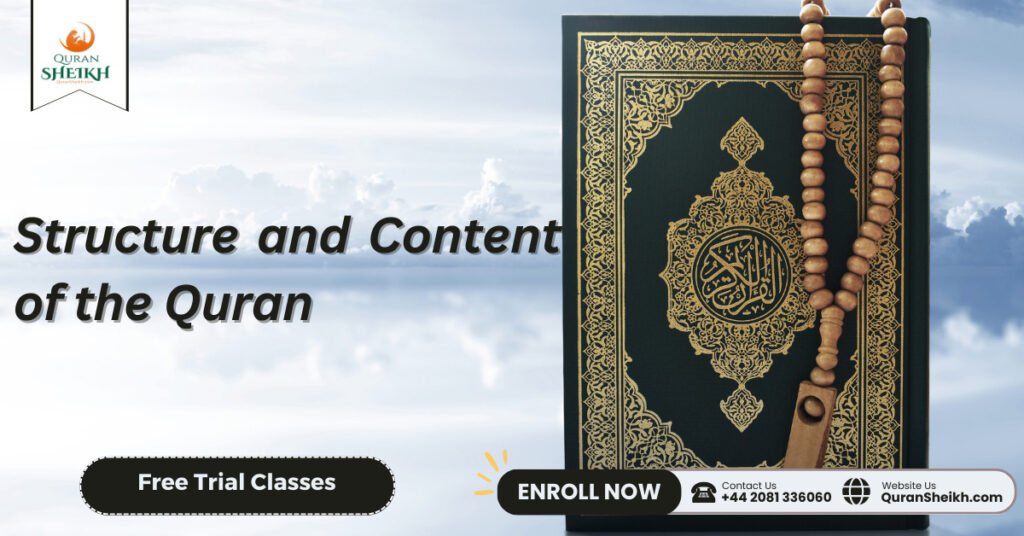1. Introduction to the Quran
Quran Course: Islam’s central religious text is the Quran, also referred to as the Holy Quran. The revelation of Allah (God) to the Prophet Muhammad through the angel Gabriel is considered significant by Muslims. With its profound teachings, ethical guidance, and spiritual wisdom, the Quran holds immense significance for Muslims around the world.
The objective of this article is to present a thorough analysis of the Quran, delving into its organization, substance, historical circumstances, and the advantages associated with its study.
We will delve into various techniques and resources for Quranic studies, discuss the importance of memorization and recitation, and explore the art of interpreting and applying its teachings.
Additionally, we will address the challenges faced by learners and offer useful tips for effectively learning the Quran. No matter if you are just beginning or aiming to enhance your knowledge, this comprehensive article will be a valuable companion on your meaningful Quranic expedition.
Join thousands of Muslim Families who love learning Quran, Arabic and Islamic Studies from the comfort of their Homes.
1. Introduction to the Quran

1.1 The Origins of the Quran
Regarded as the sacred scripture of Islam, the Quran holds immense importance in the daily existence of countless individuals globally. The word of God is commonly believed to have been disclosed to Prophet Muhammad during the 7th century CE, spanning across 23 years.
Muslims regard it as the ultimate guide for leading a righteous life and the key to spiritual enlightenment.
1.2 The Structure of the Quran
Just like any book, the Quran is composed of chapters and verses. However, its structure and organization are quite unique. It consists of 114 chapters, known as Surahs, of varying lengths. The Surahs are further divided into verses, called Ayahs.
Each Ayah is an individual unit of divine guidance, providing wisdom and teachings for Muslims to follow.
2. Structure and Content of the Quran

2.1 Divisions and Chapters of the Quran
The Quran is divided into thirty equal parts, called Juz’. This division facilitates the recitation of the Quran throughout the month of Ramadan, as one Juz’ is usually recited each night.
Moreover, the Quran is also subdivided into smaller units called Hizb, which aids Muslims in the process of memorization and study.
2.2 Surahs and Ayahs in the Quran
The Surahs of the Quran cover a wide range of topics, including faith, morality, social issues, laws, and stories of past prophets. Some Surahs are lengthy and comprehensive, while others are shorter and more focused. Meanwhile, the Ayahs within each Surah offer specific guidance and insights, serving as building blocks of knowledge for Muslims.
Quran Memorization Course Online with an Arab teacher with 30% Off
3. Importance and Benefits of Studying the Quran

3.1 Spiritual Significance of the Quran
Studying the Quran holds immense spiritual significance for Muslims. Having this capability grants them the opportunity to establish a profound connection with their faith and foster an enhanced relationship with God.
By exploring its verses, Muslims seek solace, guidance, and a source of inspiration to navigate the complexities of life while staying true to their beliefs.
3.2 Personal and Social Benefits of Quranic Study
Aside from the spiritual aspects, studying the Quran brings numerous personal and social benefits. It instills moral values, such as compassion, justice, and patience, which are essential for personal growth and harmonious interactions within communities. The Quranic teachings also promote empathy, respect, and understanding, fostering a more inclusive and tolerant society.
4. Understanding the Historical Context of the Quran
4.1 The Life and Times of Prophet Muhammad
To obtain a thorough comprehension of the Quran, it is vital to explore the historical backdrop in which it was disclosed. The life and times of Prophet Muhammad provide valuable insights into the circumstances that influenced the verses. Knowledge about the challenges, triumphs, and societal norms of that era aids in interpreting the Quran’s message accurately.
4.2 Relevance of Historical Context in Quranic Interpretation
Understanding the historical context helps in avoiding misinterpretation and misconceptions when studying the Quran. It enables a reader to differentiate between universal principles and practices specific to that era.
By appreciating the context, one can apply the timeless wisdom of the Quran in contemporary situations, adapting its teachings to the evolving needs of society.
5. Techniques and Resources for Quranic Studies
5.1 Approaches to Qur’anic Studies
In regards to studying the Quran, one can explore different approaches. Some people prefer a chronological study, starting from the beginning and working their way through. Others may prefer a thematic approach, focusing on specific topics or concepts within the Quran. Unearth the approach that personally speaks to you and facilitates a deep connection with the teachings of the Quran.
5.2 Recommended Books and Online Resources
In this digital age, there are plenty of resources available to enhance your Quranic studies. From mobile apps that provide translations and recitations to websites that offer in-depth explanations and tafsir (interpretation) of the verses, the options are endless.
Some highly recommended books for Quranic studies include “The Study Quran” by Seyyed Hossein Nasr and “Approaching the Quran” by Michael Sells. Explore these resources to deepen your understanding of the Quran.
6. Memorization and Recitation of the Quran
6.1 Benefits and Virtues of Quranic Memorization
Memorizing the Quran is not only a spiritual endeavor but also a cognitive exercise. It improves your memory skills and enhances your focus and concentration.
Additionally, Quranic memorization brings forth innumerable rewards as Prophet Muhammad (peace be upon him) attested that those who commit the Quran to memory shall find themselves in the presence of esteemed angels.
So, not only will you have the words of Allah in your heart, but you’ll also earn extra brownie points with the divine beings.
6.2 Tips and Techniques for Effective Memorization
To alleviate the harshness of the procedure, adhere to these principles. Break the verses into smaller sections and repeat them daily. Use mnemonic devices or create a melody to help remember the words.
Additionally, finding a Quran teacher or joining a study group can provide support, guidance, and accountability in your memorization journey. Remember, Rome wasn’t built in a day, and neither will your Quranic memorization skills. Take it one verse at a time and celebrate your progress along the way.
7. Interpreting and Applying the Teachings of the Quran
7.1 Principles of Quranic Interpretation
Interpreting the Quran requires a balanced approach. Gaining a comprehensive understanding of the verses necessitates an appreciation for the historical context, a command over the Arabic language, and a deep understanding of broader Islamic teachings. Additionally, seeking guidance from scholars and studying reputable tafsir works can help navigate the complexities of interpretation.
Keep in mind that it’s not only about scanning the words; it’s crucial to grasp their intended significance and incorporate them into your daily existence.
7.2 Applying Quranic Teachings in Daily Life
The ultimate goal of studying the Quran is to embody its teachings and principles in our daily lives. This means practicing compassion, justice, and kindness towards others. It means striving for personal growth and self-improvement.
The Quran provides guidance for every aspect of life, be it social interactions, family dynamics, or personal ethics. By applying the teachings of the Quran and reflecting upon its wisdom, we can endeavor to enhance our Muslim identity and make a constructive difference in the world.
8. Challenges and Tips for Learning the Quran
8.1 Overcoming Challenges in Quranic Learning
Learning the Quran can present its fair share of challenges. The language barrier, the complexity of certain concepts, and the demands of daily life can sometimes make it challenging to stay consistent in our studies. Nonetheless, one mustn’t forget that every attempt holds importance, irrespective of its size.
Take it easy on yourself, and never forget that education is an everlasting expedition. Endure the hardships, and you will enjoy the fruits of your commitment.
8.2 Effective Strategies for Successful Quranic Learning
To make your Quranic learning journey more successful, here are some strategies to consider. Create a study schedule and stick to it. Set realistic goals for each study session and track your progress. Utilize multimedia resources such as audio recitations and visual aids to enhance your understanding.
Lastly, find a supportive community of fellow learners who can provide motivation and guidance along the way. By adopting effective strategies and cultivating an optimistic mindset, you will pave your path towards gaining mastery over the teachings of the Quran.
In conclusion, the Quran is a profound and sacred text that holds immense significance for Muslims worldwide. The teachings, guidance, and wisdom provided by it serve as an endless wellspring of inspiration, spirituality, and personal development.
Through the examination of the Quran, individuals can acquire a profound comprehension of Islam, its values, and the divine message of Allah.
Whether you are exploring the Quran for the first time or seeking to enhance your knowledge, embracing the Quranic journey can bring immense blessings and transformative change to your life.
Therefore, let us treasure the magnificence of the Quran, commit ourselves to its exploration, and endeavor to incorporate its lessons into our everyday existence, thereby encountering the genuine core of this sacred disclosure.
How to learn Quran fluently?
- Set realistic goals. Don’t expect to be able to read the Quran fluently overnight. Start by learning the basics of Arabic pronunciation and tajweed (the rules of recitation). Then, gradually increase the amount of time you spend reading the Quran each day.
- Find a good teacher. A good teacher can help you learn the Quran correctly and efficiently. They can also help you correct your mistakes and answer your questions.
- Practice regularly. The more you practice, the better you will become at reading the Quran fluently. Try to set aside some time each day to practice reading the Quran.
- Be patient. Learning to read the Quran fluently takes time and effort. Don’t get discouraged if you don’t see results immediately. Just keep practicing and you will eventually achieve your goal.
Here are some additional tips that may help you learn the Quran fluently:
- Listen to Quran recitations by experienced reciters. This will help you develop a good ear for the correct pronunciation and intonation.
- Read the Quran with understanding. This means learning the meaning of the words and phrases you are reading.
- Memorize short passages of the Quran. This will help you become more fluent in your recitation.
- Join a Quran study group or class. This is a great way to learn from others and stay motivated.
What is Ijazah in Quran?
Ijazah in Quran is a license that authorizes its holder to transmit certain Quranic knowledge to others. It is typically issued by a qualified scholar or teacher who has been authorized by their own teachers in an unbroken chain going back to the Prophet Muhammad (peace be upon him). Ijazah is considered to be an important way of ensuring that the Quran is transmitted accurately and correctly. It also helps to preserve the Quranic tradition and to ensure that it is accessible to future generations.
Here are some key points about ijazah in Quran:
- It is a license to transmit Quranic knowledge.
- It is typically issued by a qualified scholar or teacher.
- It is an unbroken chain of authorization going back to the Prophet Muhammad (peace be upon him).
- It is considered to be an important way of ensuring the accuracy and correctness of the Quran.
- It helps to preserve the Quranic tradition and to make it accessible to future generations.
Why is learning Arabic important in the Quran?
The Quran is the word of God revealed to the Prophet Muhammad in Arabic. It is the most important text in Islam, and Muslims believe that it is the perfect and final revelation from God. Therefore, it is important for Muslims to learn Arabic in order to understand the Quran and its message.
There are many benefits to learning Arabic. It can help you to better understand the Quran, pray more effectively, and connect with other Muslims. It can also be a great way to learn about Islamic culture and history.
If you are interested in learning Arabic, there are many resources available to you. You can take classes, study online, or find a tutor. No matter how you choose to learn, it is a rewarding experience that will enrich your life.
Here are some specific reasons why learning Arabic is important in the Quran:
- The Quran is a complex and poetic text that is full of subtleties that can be lost in translation.
- Learning Arabic will help you to understand the Quran’s grammar, vocabulary, and pronunciation.
- You will be able to read the Quran in its original language and appreciate its beauty and power.
- You will be able to participate in Islamic studies and discussions with greater understanding.
- You will be able to connect with other Muslims from all over the world.
If you are a Muslim, I encourage you to learn Arabic. It is a valuable skill that will enrich your life and help you to better understand your faith.
Best Quran memorization program with qualified Arab tutors and get 30% OFF, Quran classes for Kids
FAQ
Q: Is knowledge of Arabic necessary to study the Quran?
A: While understanding Arabic can certainly enhance the study of the Quran, it is not a prerequisite. Numerous translations and resources are available in various languages to facilitate Quranic learning and comprehension for individuals who do not know Arabic.
What is the average time needed to memorize the Quran entirely?
A: The time required to memorize the entire Quran can vary significantly depending on factors such as dedication, memorization techniques, and individual aptitude. It can take several years of consistent effort and practice to achieve this feat.
However, it is important to remember that even memorizing a few verses or chapters can be a meaningful accomplishment in one’s Quranic learning journey.
Q: Are there any recommended online platforms or resources for Quranic studies?
A: Yes, there are several reputable online platforms and resources available for Quranic studies. Some popular options include Quran study apps, websites offering Quranic tafsir (interpretation), online courses, and virtual Quranic learning programs.
To enrich your journey of learning, it is recommended that you explore various platforms and discover the one that aligns with your unique learning style and objectives.
How can the teachings of the Quran be incorporated into my daily routine?
A: Applying the teachings of the Quran in daily life involves understanding the principles and values it promotes and striving to embody them in your actions and interactions. This can include practicing kindness, compassion, honesty, justice, and maintaining a strong connection with Allah through prayer and reflection. Finding answers and wisdom from the Quran for various aspects of existence is a continual journey towards personal development.


